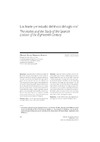Identificador persistente para citar o vincular este elemento:
https://accedacris.ulpgc.es/jspui/handle/10553/41326
| Campo DC | Valor | idioma |
|---|---|---|
| dc.contributor.author | Perdomo Batista, Miguel A. | en_US |
| dc.date.accessioned | 2018-06-19T13:13:23Z | - |
| dc.date.available | 2018-06-19T13:13:23Z | - |
| dc.date.issued | 2018 | en_US |
| dc.identifier.issn | 0213-2370 | en_US |
| dc.identifier.uri | https://accedacris.ulpgc.es/handle/10553/41326 | - |
| dc.description.abstract | Juan de Iriarte y Cisneros y sus sobrinos Bernardo, Tomás y Domingo de Iriarte y Nieves-Ravelo conformaron uno de los núcleos intelectuales más importante de la España del siglo XVIII. Algunos de los manuscritos que nos dejaron son interesantes para la lexicología y la lexicografía históricas. Por una parte, pueden aportarnos datos sobre el desarrollo de ambas disciplinas en la etapa; por otra, y sobre todo, nos facilitan el conocimiento del léxico de la época. Siguiendo una metodología historiográfica, nuestro examen ofrecerá datos de obras desconocidas, y mostrará también cómo la ascensión política y social de los Iriarte estuvo vinculada a sus proyectos filológicos. | en_US |
| dc.description.abstract | Juan de Iriarte y Cisneros and his nephews, Bernardo, Tomás and Domingo de Iriarte y Nieves-Ravelo formed one of the most important intellectual groups of the eighteenth century Spain. Some of the manuscripts left to us are interesting for historical lexicology and lexicography. On the one hand, they can provide data on the development of both disciplines on the stage; on the other, and above all, they provide knowledge of the Spanish lexicon of the time. Our review will provide information about unknown works, and also show how the political and social ascension of the Iriartes was linked to their philological projects. | en_US |
| dc.language | spa | en_US |
| dc.relation.ispartof | RILCE. Revista de Filologia Hispanica | en_US |
| dc.source | RILCE. Revista de Filología Hispánica [ISSN 0213-2370], v. 34 (2), p. 690-715 | en_US |
| dc.subject | 57 Lingüística | en_US |
| dc.subject.other | Iriarte | en_US |
| dc.subject.other | Siglo XVIII | en_US |
| dc.subject.other | Lexicografía | en_US |
| dc.subject.other | Lexicología | en_US |
| dc.subject.other | Léxico latino | en_US |
| dc.subject.other | Ilustración española | en_US |
| dc.subject.other | 18th Century | en_US |
| dc.subject.other | Lexicography | en_US |
| dc.subject.other | Lexicology | en_US |
| dc.subject.other | Latin Lexicon | en_US |
| dc.subject.other | Spanish Enlightenment | en_US |
| dc.title | Los Iriarte y el estudio del léxico del siglo XVIII | en_US |
| dc.title.alternative | The Iriartes and the study of the Spanish lexicon of the eighteenth century | en_US |
| dc.type | info:eu-repo/semantics/article | en_US |
| dc.type | article | en_US |
| dc.identifier.doi | 10.15581/008.34.2.690-715 | en_US |
| dc.identifier.scopus | 85047800003 | - |
| dc.identifier.isi | 000432909400011 | - |
| dc.contributor.authorscopusid | 57202302259 | - |
| dc.description.lastpage | 715 | en_US |
| dc.description.firstpage | 690 | en_US |
| dc.relation.volume | 34 | en_US |
| dc.investigacion | Artes y Humanidades | en_US |
| dc.type2 | Artículo | en_US |
| dc.contributor.daisngid | 3097430 | - |
| dc.utils.revision | Sí | en_US |
| dc.contributor.wosstandard | WOS:Batista, MAP | - |
| dc.date.coverdate | Julio 2018 | en_US |
| dc.identifier.ulpgc | Sí | en_US |
| dc.contributor.buulpgc | BU-HUM | en_US |
| dc.description.sjr | 0,226 | |
| dc.description.jcr | 0,221 | |
| dc.description.sjrq | Q1 | |
| dc.description.jcrq | Q4 | |
| dc.description.sellofecyt | Sello FECYT | |
| dc.description.ahci | AHCI | |
| dc.description.ssci | SSCI | |
| dc.description.fecytq | Q1 | |
| dc.description.fecytpuntuacion | 89,24 | |
| dc.description.dialnetimpact | 0,0 | |
| dc.description.dialnetq | Q1 | |
| dc.description.dialnetd | D1 | |
| dc.description.erihplus | ERIH PLUS | |
| item.fulltext | Con texto completo | - |
| item.grantfulltext | open | - |
| crisitem.author.dept | GIR Investigaciones literarias y lingüísticas en español | - |
| crisitem.author.dept | Departamento de Filología Hispánica, Clásica y de Estudios Árabes y Orientales | - |
| crisitem.author.orcid | 0000-0002-5019-2368 | - |
| crisitem.author.parentorg | Departamento de Filología Hispánica, Clásica y de Estudios Árabes y Orientales | - |
| crisitem.author.fullName | Perdomo Batista, Miguel Angel | - |
| Colección: | Artículos | |
Citas SCOPUSTM
1
actualizado el 08-jun-2025
Visitas
51
actualizado el 10-ene-2026
Descargas
45
actualizado el 10-ene-2026
Google ScholarTM
Verifica
Altmetric
Comparte
Exporta metadatos
Los elementos en ULPGC accedaCRIS están protegidos por derechos de autor con todos los derechos reservados, a menos que se indique lo contrario.
